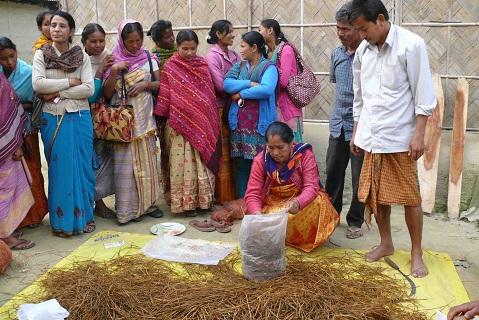A process of confidence building among the women themselves seems to have started. Their increased ability to articulate their needs, as is evident, is an important aspect of their identity building. Their world has expanded and their confidence is soaring and this was no exception to the women in the fringe villages of Manas National Park, who on Monday came forward and actively participated in a day-long training programme organized by Aaranyak in association with Forest Department, Bodoland Territorial Council at Bhuyanpara in Manas National Park.
Women, particularly, in wildlife areas are vulnerable to poverty and leads a life dependent on forest resources. Limited access to basic infrastructure like roads, communication and electricity makes it difficult for women to access information, markets and services necessary to improve their livelihoods. Therefore, with an aim to provide women hailing in the fringe villages, with an alternative sustainable livelihood option independent of forest resources, Aaranyak conducted a training programme- ‘Mushroom Training for fringe villages of Manas National Park’.
“Fringe villagers depending on the forest resources for livelihood are a common scenario in Manas National Park. So, we targeted the Women Self Help Groups, which were not actively engaged in livelihood activities yet, to undergo this training and capacity building,” said Namita Brahma, Aaranyak. “However, the training programme did not remain restricted to women only. 35 participants including farmers of the fringe villages were also involved. So we decided to facilitate them with a livelihood option which is easy and profitable as well,” she added.
“We have been running our group for a long time but with very less activities due to lack of resources but this training have inculcated the confidence in us to start off with an easy process of mushroom cultivation. The entire process was practically demonstrated by the trainer and now we can soon work on it,” said Satya Chanda Das, a Self-help Group member.
“Mushroom is easy to cultivate and make profit. The best part is that it can be cultivated round the year with two varieties in summer and winter respectively,” said Nabin Basumatary, a farmer. The training was efficiently conducted by GK Upamanyu, Scientist, Krishi Vigyan Kendra, Howli along with the field staff of Aaranyak.
Loss of an ecosystem will not only destroy wildlife but the traditional livelihood of indigenous people of the region. Exposure to financial transaction and a feeling of contributing the families’ financial security has given the women a sense of confidence and improved their status, in varying degrees, within the household.
Aaranyak, a leading bio-diversity group in Assam, started a novel project a few years ago to provide means of alternative livelihood to the people in the fringe areas of Manas National Park who have been dependent on the jungle for their daily necessities.
- 10435 reads










Add new comment